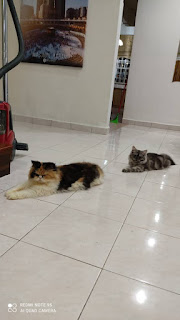After losing Lofa, loved by everyone in the house, brought me to a whole lot of deeper thinking. The more urgency I need to care for my family and for my own self. The wrinkles that appeared on my hands and legs are signs that I'm running our of time (am grateful to understand this). If my body grows physically weaker, I do hope my mind becomes clearer and wiser in thoughts. I hope I can go before I grow senile or become a burden to my family.
Having gone through much experience as an academic, I thought I should share my thoughts here and it doesn't matter if they are ignored. Much of the things I do or say have been ignored in the past, so there is nothing new in this but I do note certain people (usually beyond the place I work) do seem to listen to what I have to say. By saying this, I'm ever watchful on the things I do physically or in social media, will not be for me to seek popularity but for these actions to be considered as my good deeds.
Let me go far back in the early days of me joining the university. At the time, my thoughts were that things are pretty relaxed with activities focusing mainly on teaching. Research were probably centred on certain individuals who have started their labs and groups. At the time, I wished things to become more exciting as a scientific community with a lot of academic discussions. Tried to initiate reading groups but with varying interests, these did not last long. That drove me to just focus on my own students and build the group of one's own. The formation of the theoretical lab in the institute, has helped to expand the group much. It seems that I have attracted quite a number of students from outside UPM (see list here) and within UPM, there are a few students that went on to do their graduate study with me, but most UPM students tend to run away from theoretical physics (even those that took up final year projects with me). Alhamdulillah, today we do have a sizable theory group in the department. Each of my younger colleagues are now pursuing their own research directions. I do still hope though some of the research directions I have started, will still be continued to a certain degree, even if they are difficult.
Management-wise of the early days, I do remember participating within small workgroups and committees (pre-ISO days) to discuss what can be improved. One of the mantra those days is that we have good aims and projects but we do poorly on monitoring. Then came the ISO-days with the initial promise of we only document what we normally do. But we have gone way past that (unfortunately) and now we are forced to do more than what we normally do, in the name of continual improvement. So, in this sense, we have swung to the other monitoring extreme of controlling what we do. I do know when we first started some of these documentations, we have good reasons to maintain since some of the older records tend to get lost. For instance, the document of minutes of meeting are important when tracing the reason of why certain decisions are made. Lecture notes/test questions are kept so that future academics may be able to use them for at least historical purpose. Some of what I have done e.g. for test questions, have been adopted by the Faculty (though I must say, I don't expect people to follow the way that I do strictly since I do not consider them to be formal publications of any sort). See picture below for the example of bilingual test (English in italics since Malay is the official language) with marks at the end of each question (with some changes, we are now expected to follow this strictly). This documenting intent, to me, has somewhat changed, subject to the mercy of the auditing committee. There is already a threatening atmosphere for those who 'fail to comply' to what the auditors report. Not sure whether this is the type of atmosphere we want to keep.
In those early days, we were told that meetings are made to make decisions. Any lengthier discussions are best relegated to workshops of (trusted) subcommittees to look into details, whose output only to be presented (briefly) in the main meeting later - and best to have the report earlier for people to at least glance. This is what I have done at ITMA for instance (being responsible for publication committee) and partially in INSPEM. I noticed a lot of the meetings today tend to focus on reports and not decisions to be made. Our understanding in the early days (at least the way I was taught), one should be more prudent on the time and energy spent by so many people in a large meeting (analogous to a congregation in the mosque for Friday prayers). Being part of the management before, I can attest to that I have contribute a significant portion of my life to be in meetings and in many, I consider myself mainly as quorum fulfilling member. Given this, can we do better with our time?
A lot of things in my early academic life includes the aspiration of being a good Muslim scientist. Bought a lot books on religion beyond the books that I have in science. Having seen how academics work nowadays, I am no longer sure about the scientist part anymore. A lot of what I see today thrives on ego but yet the religious part of me tries to deflate it. Can we really harmonize this? Is the picture of an academic being a deep thinker and wise, no longer tenable? Some of these have me wishing to retire earlier (unfortunately).



















































